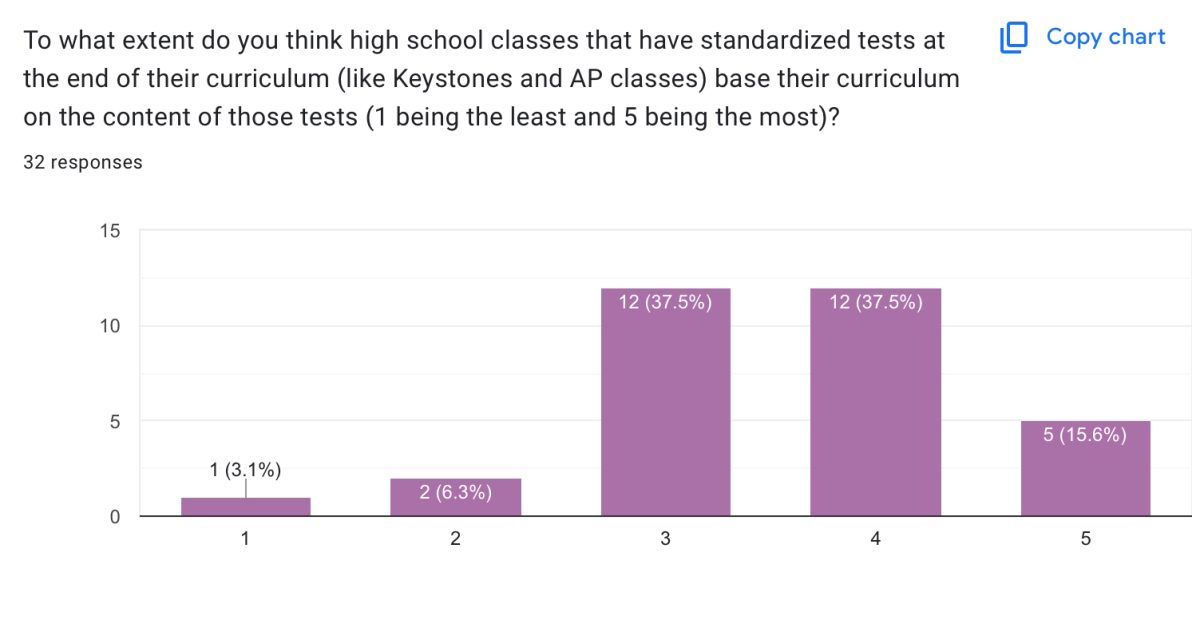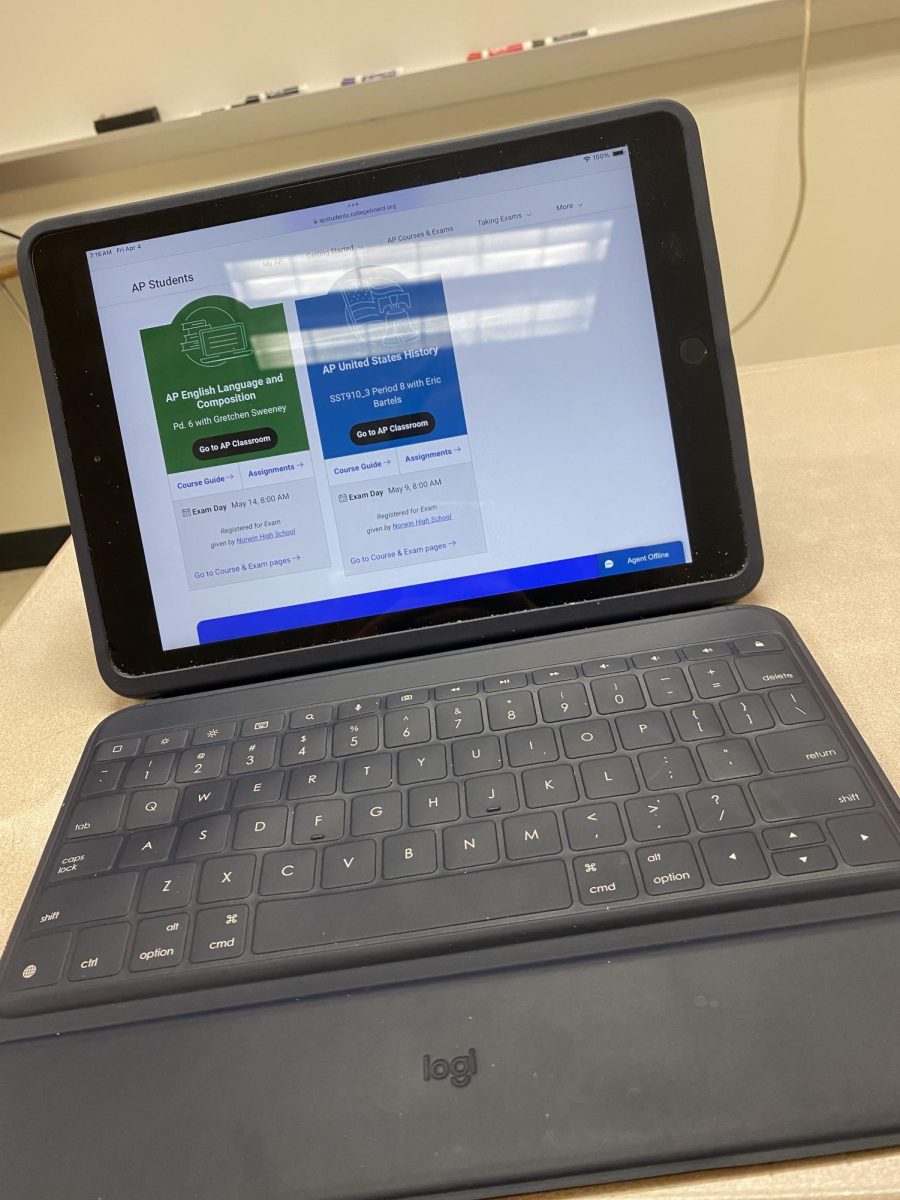Standardized testing is a requirement for Norwin High School students. While standardized tests like AP tests are optional for students, exams like the Keystone assessments are mandatory. Many different classes — ranging from AP classes to freshman biology classes — are designed to, at least in part, prepare students for their end of year standardized tests on the class material. Yet the questions remain: Is Norwin successful at preparing students for standardized tests and why are standardized tests important to students?
Some common ways that Norwin teachers prepare students for standardized tests are practice tests, testing tips, practice writings, and AP Classroom / Keystone practice. Yet each teacher’s style is different, and that includes the ways in which they prepare students for tests like the Keystones and AP tests.
“Since the coursework has become so skill-focused, I liken it to being a coach,” said Mr. Eric Bartels, a teacher of AP Human Geography and AP U.S. History at Norwin. “Coaches are types of teachers of course, but I admire the athletic coaches here who are so good at engaging with their players by diagnosing flaws in their game and how to adapt. It’s not a natural thing for me but something I have observed is important. In the classroom, then, I have to give the students opportunities to practice in the way they’ll be challenged in an assessment, much like practicing for game situations on an athletic court or field.”
While there are different ways that teachers prepare their students for standardized tests, students seem to find their methods successful. According to a Norwin student Knight Krier poll, 48 percent of students polled rated the extent to which classes prepared them for standardized tests as a 4 out of 5, with 5 being the most prepared and 1 being the least prepared.
Many classes that prepare students for standardized tests base the curriculum of the class off the test content due to required material and content.

“Aside from a small number of topics that I enjoy adding to the curriculum,” said Bartels, “my courses are almost entirely driven by the College Board’s curriculum. For starters, the CB reviews my syllabus each year and it must demonstrate that I intend to teach each component of the AP curriculum. I am free to add things in of course, but there is often little time to do that.”
Standardized tests are important to students’ education for different reasons depending on the test. AP tests can provide students with college credits which can help students save money if they plan on attending college. Tests like the Keystones, on the other hand, arguably serve a greater purpose to the school than they do to the individual.
According to Forbes magazine, “Standardized tests are used to set national and state policy for education reform, inform local decision-making, identify accountability measures, and make decisions regarding resource allocation.”
For schools and, in the case of AP tests in particular, colleges, standardized tests act as a way to evaluate students’ understanding of various topics in an easily comparable way. According to a random poll of Norwin students, opinions about the value of standardized tests among students is very mixed.
“I believe that standardized tests do have some value as a benchmark of your skills,” said Norwin junior Elizabeth Petteway. “You can look at the score of your test and get a better idea of what needs to be fixed or workshopped.”
This was a fairly common mindset; the tests work as a benchmark yet are not extraordinarily helpful to students. Another mindset was that the classes are beneficial to students while the tests are mostly beneficial only for college credit (in the case of AP tests).
“I really don’t believe that the standardized test have much value towards my education like the AP and Honors classes themselves do,” said junior Morgan Stephan, “other than to prove you are proficient in a specific topic and to maybe earn you money towards college. The tests themselves do not enhance your knowledge or earn you a better grade in a class.”
The third mindset — the most negative towards standardized tests — posits that the tests have no value to the student while not commenting on the value of the tests to the school or teachers. Most people with a negative outlook on standardized tests focused mainly on the applicability of the material and the stress of the tests. This mindset was less common, but there were a few students polled who had that perspective.
“They are simply not helpful anymore,” said senior Daelyn Gardner. “These tests are stressful, unnecessary, and do not prepare us for our future.”
Yet, from a teacher’s perspective, standardized tests act as a form of student and teacher accountability. Standardized tests like AP tests can also give students more insight into college-level expectations and the kinds of work involved in various career fields.
“Standardized tests are valuable in several ways,” said Bartels. “First of all, they hold the teachers more accountable to do our jobs well. It creates a clear and measurable expectation for what success looks like. It does the same for student accountability too. Another value of the current format of AP testing is that to some extent they demonstrate what people in career fields for that subject actually do for a living.”
Ultimately, standardized test preparation depends on the specific test, the type of class, and the teacher’s preferences. According to Norwin students, Norwin prepares students fairly well for standardized tests, but some students do not see the value of the tests for individual students. While AP tests have an obvious and direct impact on students, Keystone exams have more of an impact as an evaluation of schools.
“They [standardized tests] give you a lot of important information to learn that can be helpful once you leave high school and maybe a career you’re interested in,” said sophomore Cadigan Sharp.









